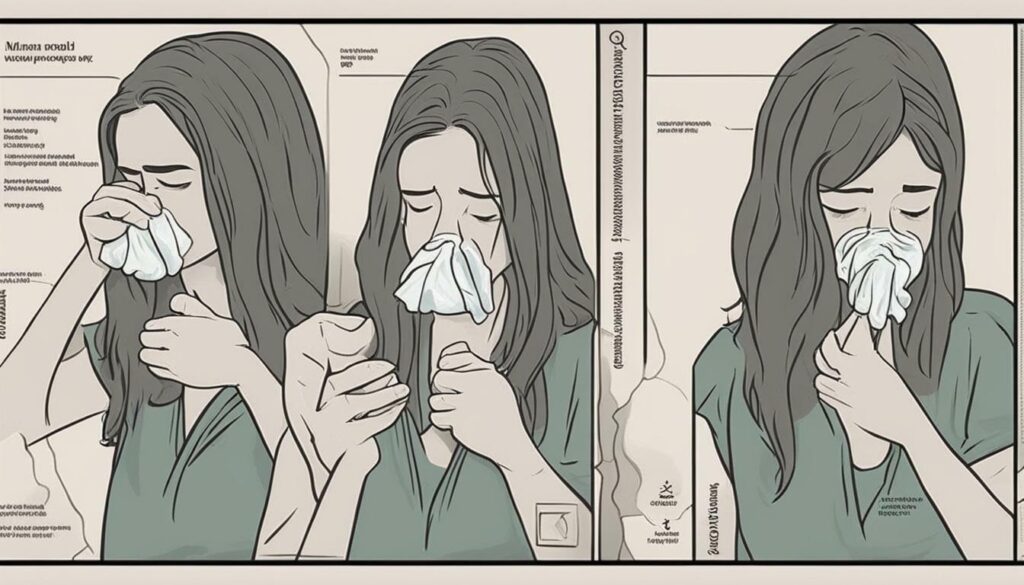Mold exposure can have detrimental effects on your health, so it’s crucial to be aware of the various symptoms associated with mold poisoning. Whether you’ve recently encountered mold at home or work, or you’re experiencing unexplained symptoms, it’s essential to understand the warning signs and seek medical attention if needed.
In this section, we’ll explore the common signs and symptoms of mold poisoning, including respiratory issues, skin problems, and digestive trouble. By the end, you’ll have a better understanding of what to look out for when it comes to mold exposure symptoms.
Key Takeaways
- Mold exposure can have serious health implications, so it’s important to be aware of the signs and symptoms.
- Symptoms of mold poisoning can range from respiratory issues to skin problems and digestive trouble.
- If you’re experiencing any of these symptoms, it’s crucial to seek medical attention for proper diagnosis and treatment.
Understanding Mold Poisoning
If you are exposed to mold, it can have various health effects on your body. Mold toxicity can lead to different symptoms, ranging from mild to severe. Understanding the dangers of mold exposure and the ensuing symptoms is crucial to protecting your health.
Some of the common health effects of mold exposure include:
- Allergic reactions
- Respiratory symptoms
- Nasal symptoms
- Skin symptoms
- Neurological symptoms
- Digestive symptoms
- Generalized symptoms
These symptoms may be experienced immediately after mold exposure, or they may develop gradually over time, depending on the length and amount of exposure. It is important to note that some individuals may have greater sensitivity to mold than others, leading to varying severity of symptoms.
In some cases, mold exposure can result in mold illness, which can cause chronic health issues. Mold illness symptoms include fatigue, weakness, headaches, difficulty concentrating, and memory problems.
Overall, it is essential to take mold exposure seriously and take the necessary precautions to safeguard your health.

Allergic Reactions to Mold
If you are allergic to mold, exposure to it can cause allergic reactions. The symptoms of mold allergies can be similar to those of other allergies. These symptoms can range from mild to severe, depending on the extent of your exposure to mold.
The most common allergic reaction to mold includes sneezing, runny or stuffy nose, itchy eyes, and skin irritation. Additionally, mold exposure can trigger asthma attacks in people who have asthma. If you experience wheezing, coughing, or difficulty breathing after being exposed to mold, seek medical attention immediately.
Some people may experience more severe allergic reactions to mold, such as fever and shortness of breath. These symptoms can be indicative of a more severe allergic reaction or mold toxicity. If you experience any of these symptoms, seek medical attention right away.
If you suspect that you are allergic to mold, it is important to take steps to limit your exposure. This includes reducing the humidity in your home, fixing any leaks or water damage, and regularly cleaning mold-prone areas such as bathrooms and kitchens.

Respiratory Symptoms
Exposure to mold can have detrimental effects on your respiratory system. If you have been exposed to mold, you may experience a variety of respiratory symptoms that indicate mold exposure. These symptoms can range from mild to severe and may include:
- Coughing
- Sneezing
- Wheezing
- Shortness of breath
- Chest tightness or pain
- Runny or stuffy nose
It is crucial to pay attention to these symptoms and take necessary precautions to protect your respiratory health. If you experience any of these symptoms, it is important to seek medical attention promptly. Your healthcare provider can diagnose and treat any respiratory issues that may be related to mold exposure.
Remember, mold exposure symptoms can vary from person to person, and not all individuals will display the same symptoms. However, if you experience any respiratory symptoms after exposure to mold, do not hesitate to seek medical attention.

“Mold exposure can have detrimental effects on your respiratory system. If you have been exposed to mold, you may experience a variety of respiratory symptoms that indicate mold exposure.”
Nasal Symptoms
Mold can irritate your nasal passages, causing a range of symptoms. These symptoms can include:
- Congestion: Your nasal passages may feel stuffy or blocked, making it difficult to breathe.
- Runny nose: You may experience a persistent runny nose that does not go away even with medication.
- Sneezing: You may sneeze frequently, especially when you are exposed to mold.
- Nosebleeds: In severe cases, mold can cause nosebleeds.
If you are experiencing these nasal symptoms, it could be a sign of mold exposure. It’s essential to seek medical attention to determine the cause of your symptoms and receive appropriate treatment.

Skin Symptoms
Mold exposure can have visible effects on your skin. If you notice any of the following skin symptoms, it may be an indication of mold exposure:
| Skin Symptoms | Description |
|---|---|
| Rashes | Mold exposure can cause redness, itching, or inflammation on the skin. |
| Hives | Hives are raised, itchy bumps that can appear on the skin due to an allergic reaction to mold. |
| Itching | Mold exposure can cause persistent itching on the skin. |
| Burning | Some people may experience a burning sensation on the skin due to mold exposure. |
If you are experiencing any of these skin symptoms in combination with other mold exposure symptoms, it is crucial to seek medical attention.

Neurological Symptoms
If you experience mold exposure, you may encounter neurological symptoms. These symptoms are related to the nervous system and can affect your brain, spinal cord, and other parts of your body.
Neurological symptoms can include:
- Headaches
- Dizziness
- Fatigue
- Tremors
- Memory loss
- Confusion
In severe cases, mold toxicity can lead to more severe neurological symptoms, such as seizures and paralysis.
If you are experiencing any of these symptoms, it is important to seek medical attention immediately. A healthcare professional can evaluate your symptoms and determine the appropriate treatment.

Nasal Symptoms
If you’ve been exposed to mold, you may experience a range of unpleasant nasal symptoms. These symptoms can be caused by inhaling mold spores or by direct contact with mold. In either case, it is essential to recognize these symptoms to seek treatment promptly.
The common nasal symptoms of mold exposure include:
- Runny or stuffy nose
- Sneezing
- Nasal congestion
- Itchy or watery eyes
- Nosebleeds
These symptoms can be alarming, but they are treatable. Antihistamines, nasal corticosteroids, and decongestants can significantly help reduce these nasal symptoms. However, the best treatment is to avoid mold exposure altogether.
If you are experiencing any of the above symptoms, it is vital to look for mold in your surroundings. Check your home, workplace, or any other areas you frequently visit, such as the gym or library, for any signs of mold. Mold can grow in damp areas such as bathrooms, kitchens, and basements.
It’s worth noting that some types of mold, such as black mold, can have more severe effects on your health. If you have been exposed to black mold, seek medical attention immediately. Symptoms of black mold exposure can include respiratory issues, dizziness, tremors, seizures, and even death in severe cases.

Generalized Symptoms
In addition to the specific symptoms mentioned earlier, mold exposure can also manifest in various generalized symptoms. These symptoms may not be directly related to a particular system or organ but can still indicate mold poisoning.
- Fatigue: Mold exposure can cause fatigue, weakness, and a lack of energy. You may feel tired or exhausted even after getting enough rest.
- Headaches: Headaches are a common symptom of mold poisoning. You may experience migraines, tension headaches, or sinus headaches.
- Fever: A low-grade fever is another possible symptom of mold exposure.
- Chills: You may experience chills or feel cold even in warm temperatures.
- Sensitivity: Mold exposure can make you more sensitive to light, sound, and other stimuli.
- Weak immune system: Long-term mold exposure can weaken your immune system, making you more vulnerable to illnesses and infections.
If you are experiencing any of these generalized symptoms along with the specific symptoms mentioned earlier, it is crucial to seek medical attention. Your healthcare professional can diagnose and treat your condition, providing you with the necessary care to improve your health and well-being.

Black Mold Poisoning Symptoms
Black mold, also known as toxic mold, can have severe health implications. It produces mycotoxins that can impact your health. Exposure to black mold can result in various symptoms, including:
- Respiratory Symptoms: Black mold can cause respiratory symptoms, such as coughing and wheezing. It can also lead to bronchitis and asthma.
- Nasal Symptoms: Exposure to black mold can irritate your nasal passages, resulting in a runny or stuffy nose, frequent sneezing, and sinus infections.
- Skin Symptoms: Black mold can cause skin rashes, hives, and dermatitis.
- Neurological Symptoms: Exposure to black mold can impact your nervous system, leading to symptoms such as headaches, dizziness, and confusion.
- Digestive Symptoms: Black mold can affect your digestive system, causing nausea, vomiting, and diarrhea.
- Generalized Symptoms: Exposure to black mold can lead to general symptoms such as fatigue, body aches, and fever.
If you suspect that you have been exposed to black mold, it is important to seek medical attention immediately. Your healthcare professional can diagnose and treat any symptoms you may be experiencing.

Remember to prioritize your health and safety. If you suspect mold exposure in your home or workplace, take the necessary steps to have it removed to prevent further exposure and potential health consequences.
Seeking Medical Attention
If you’re experiencing any of the mold poisoning symptoms mentioned in this article, it’s vital to seek medical attention. Mold sickness symptoms can vary, so it’s essential to consult a healthcare professional for proper diagnosis and treatment.
Don’t wait until your symptoms worsen. Seeking medical attention early on can prevent further health complications. Your doctor may suggest various tests, including blood tests or imaging tests, to determine the cause of your symptoms. Treatment options may include medication, allergy shots, or professional cleaning services to eliminate the mold from your environment.
Ignoring mold exposure can lead to serious health problems, especially for people with weakened immune systems, allergies, or asthma. Protect your health by taking action if you suspect mold poisoning.

In conclusion, don’t hesitate to seek medical attention if you’re showing signs of mold poisoning. Your health is essential, and early intervention is crucial to prevent long-term health complications.
Conclusion
Congratulations! You’ve learned about the signs and symptoms associated with mold poisoning. Remember, mold exposure can have detrimental effects on your health, so it’s crucial to be aware of the indicators.
By understanding the various symptoms, you can take precautions to prevent mold exposure in your living spaces. If you do experience any of the symptoms mentioned, it’s important to seek medical attention immediately. Mold toxicity can lead to severe health problems, and diagnosis and treatment are essential for a healthy recovery.
Stay informed and prioritize your well-being. Regularly inspect your surroundings for any signs of mold growth, and take action if you do detect it. Remember, your health comes first!
FAQ
Q: What are the signs of mold poisoning?
A: The signs of mold poisoning can vary depending on the individual and the extent of exposure. Common indicators include respiratory symptoms, nasal symptoms, skin symptoms, neurological symptoms, digestive symptoms, and generalized symptoms. It is important to seek medical attention if you suspect mold poisoning.
Q: What are the health effects of mold exposure?
A: Mold exposure can lead to various health effects, including allergic reactions, respiratory symptoms, nasal symptoms, skin symptoms, neurological symptoms, digestive symptoms, and generalized symptoms. It is important to understand these effects and take necessary precautions to protect your health.
Q: What are the symptoms of allergic reactions to mold?
A: Symptoms of allergic reactions to mold can include sneezing, coughing, itchy or watery eyes, runny nose, and skin rash. These symptoms may vary in severity depending on the individual’s sensitivity to mold.
Q: What respiratory symptoms can be caused by mold exposure?
A: Mold exposure can cause respiratory symptoms such as coughing, wheezing, shortness of breath, chest tightness, and respiratory infections. If you experience these symptoms, it is important to consult a healthcare professional.
Q: What nasal symptoms can be caused by mold exposure?
A: Mold exposure can irritate the nasal passages, leading to symptoms such as nasal congestion, sneezing, runny nose, and sinus infections. These symptoms may indicate exposure to mold.
Q: What skin symptoms can be caused by mold exposure?
A: Mold exposure can cause skin symptoms such as redness, itching, rashes, hives, and dermatitis. If you notice any of these symptoms after exposure to mold, it is important to seek medical advice.
Q: What neurological symptoms can be caused by mold exposure?
A: Mold exposure can impact the nervous system, leading to neurological symptoms such as headaches, dizziness, memory problems, difficulty concentrating, and mood changes. If you experience these symptoms, it is important to consult a healthcare professional.
Q: What digestive symptoms can be caused by mold exposure?
A: Mold exposure can affect the digestive system, resulting in symptoms such as nausea, vomiting, diarrhea, abdominal pain, and digestive problems. If you are experiencing these symptoms, it is important to seek medical attention.
Q: What are the generalized symptoms of mold exposure?
A: Mold exposure can manifest in various generalized symptoms such as fatigue, muscle aches, joint pain, headaches, fever, and flu-like symptoms. These symptoms may indicate mold poisoning and should be evaluated by a healthcare professional.
Q: What are the symptoms of black mold poisoning?
A: Black mold, also known as toxic mold, can have severe health implications. Symptoms of black mold poisoning may include respiratory symptoms, nasal symptoms, skin symptoms, neurological symptoms, digestive symptoms, and generalized symptoms. Consult a healthcare professional if you suspect black mold poisoning.
Q: When should I seek medical attention for mold poisoning symptoms?
A: If you are experiencing any symptoms associated with mold poisoning, it is crucial to seek medical attention. A healthcare professional can provide a proper diagnosis and recommend appropriate treatment options. Do not ignore the symptoms and prioritize your well-being.